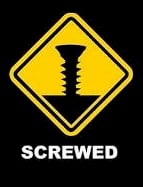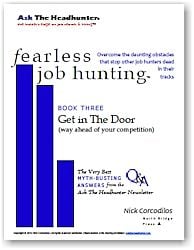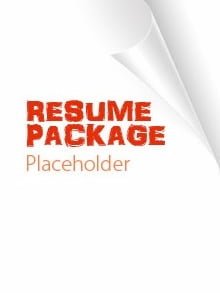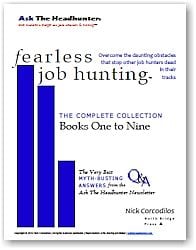In the July 16, 2013 Ask The Headhunter Newsletter, a reader asks what to do after getting screwed by a long-time employer:
After ten years, my sales performance at my company started topping the charts. The boss could not understand how I did it, but it was the personal attention I gave my customers. I did all I could to help them be more successful themselves. One day I brought on a big new client and closed a record-breaking deal worth millions. A few days later, my boss fired me. My confidence was shattered. I’ve been working the job postings but I’ve been out of work for months. Where do I go from here?
Nick’s Reply
Unless you did something unethical (or illegal) that you’re not telling me, my suspicion is that you got fired because your employer doesn’t want to pay the kinds of sales commissions you are earning. That’s silly — everyone’s making money and the customer is happy. But I’ve never been able to understand a company’s resentment against successful sales people.
 This happened once to me. I took a sales management job under a very aggressive commission plan. The head of sales designed it, and I accepted it. It was so aggressive that there was no salary or draw. It turns out they never thought I’d make the plan work for me. I was making so much money (for them and for me) that they cancelled the plan. I quit.
This happened once to me. I took a sales management job under a very aggressive commission plan. The head of sales designed it, and I accepted it. It was so aggressive that there was no salary or draw. It turns out they never thought I’d make the plan work for me. I was making so much money (for them and for me) that they cancelled the plan. I quit.
If this is your story, I don’t know why it would shatter your confidence. I’d talk with a lawyer to determine what (if anything) you’re owed for closing the deal.
It’s not uncommon for sales companies to fire a top sales rep and turn big accounts over to junior salespeople who are paid far smaller commissions.
Here you’ve been in this particular business for ten years, and you’re desperately using job postings to find a job! Cut it out! You’re wasting your time. Use the ten years of excellent contacts you’ve got! (Please don’t say, “I don’t know anybody,” because you do!)
Sit down and make a list of your best customers — companies and specific people you’ve worked with at big companies and small ones. Review the quality of your relationships. Think also about what companies they do business with — their customers, vendors, consultants and other professionals. Make a list. (If you’re reading this and you don’t work in sales and you don’t have customers, then some of the other people you encounter through your work are potential employers and potential sources of referrals to a new job. Where do you think good headhunters find new clients and great candidates?)
Note: If you have Non-Compete or Non-Disclosure Agreements (NCA or NDA), make sure you don’t violate them. Talk with a lawyer. (Ouch. That’s twice I’ve recommended lawyers in one column! You don’t think lawyers can help? Read Employment Contracts: Everyone needs promise protection.) I think it’s worth at least an initial consultation to understand your position before you take action.
Your former customers are people who know you well and respect you. These are the kinds of references you can use. Call them. Don’t ask them for a job. Tell them you’re going to work only for a top-notch company — big or small — and you would value their advice. What companies do they respect? Which ones would they recommend to you?
What do you do when a friend refers you to a company? That’s when the fun starts — and that’s when you must get to work! Fearless Job Hunting Book 5: Get The Right Employer’s Full Attention delivers the obstacle-busting answers you need:
- Don’t walk blind on the job hunt
- How to make up for lack of required experience
- Is this a Mickey Mouse operation?
- Age discrimination or age anxiety?
- How to deal with an undeserved nasty reference
- Scuttlebutt: Get the truth about private companies
- And more!
Overcome the daunting obstacles that stop other job hunters dead in their tracks!
You may find yourself referred to a competitor of your last employer. Or there may be a department in one of your old customer companies that’s dying to hire you. Or an old customer may have a customer who needs you.
Why waste time with the unknown? That’s what the job postings will get you. Focus on the people who already know you, and with whom you have good relationships and something in common.
The job market is not just job postings and want ads. It’s people. Focus on the ones who care about you because you have treated them well. They will help you if you let them.
Has anyone used this approach, whether in sales or any other line of work? I think it’s the best “insider” method for meeting your next boss!
: :







